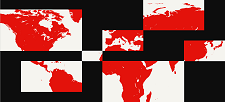Elections, democracy and misinformation

date: 03/06/2024
In 2024, countries with more than half the world’s population – over four billion people – will send their citizens to the polls, more people will vote in 2024 than in any previous year. 76 countries are scheduled to hold elections in which all voters have the chance to cast a ballot in 2024.
Through its Democracy Index, the Economist Intelligence Unit (EIU) grades countries out of ten according to the state of their democracy and categorises them from authoritarian regimes to hybrid regimes and democracies. Five aspects of democracy are measured: electoral process and pluralism, functioning of government, political participation, political culture, and civil liberties.
Of the 71 countries holding elections this year and covered by EIU’s Democracy Index, 43 will enjoy fully free and fair votes (27 of which are EU members); the other 28 do not meet the essential conditions for a democratic vote.
Eight of the ten most populous countries in the world —Bangladesh, Brazil, India, Indonesia, Mexico, Pakistan, Russia and the United States— will hold elections in 2024. In half of these, elections are neither free nor fair and many other prerequisites of democracy, such as freedom of speech and association, are absent. Elections in Bangladesh, Mexico, Pakistan (hybrid regimes combining elements of democracy and authoritarianism) and Russia (authoritarian regime) are almost certain not to bring regime change. Brazil, India, Indonesia and the United States, meanwhile, are classified by EIU as “flawed democracies”, meaning that elections are free, fair and allow for the possibility of change, but their political systems have weaknesses.
The two continents with the largest number of countries voting in 2024 are Europe (37) and Africa (18). The Middle East and North Africa is the region with the lowest overall score (3.3), while sub-Saharan Africa is not much better (4.1). African countries with a combined population of over 330m, including Algeria, Ghana and Mozambique, will hold elections. The biggest will be in South Africa, home to more than 60m people. Western Europe, meanwhile, scores highly in the index with an average of 8.4.

The Global Risks Report, published by the World Economic Forum, underlines the presence of misinformation and disinformation in these electoral processes which could seriously destabilize the real and perceived legitimacy of newly elected governments, risking political unrest, violence and terrorism, and a longer-term erosion of democratic processes.
Recent technological advances have enhanced the volume, reach and efficacy of falsified information, with flows more difficult to track, attribute and control. Social media companies' capacity to ensure platform integrity will likely be overwhelmed in the face of multiple overlapping campaigns, increasingly personalized and targeted to specific groups and minorities. The identification of AI-generated mis- and disinformation in these campaigns will not be clear-cut, becoming more difficult to differentiate from human generated content, even for detection mechanisms. Research and development continue to advance rapidly, but this area of innovation is radically underfunded in comparison to the technology it aims to detect.
The implications of these manipulative campaigns could be profound, threatening democratic processes, global trade and financial markets as well as interstate relations.
More information: EIU's Democracy Index and World Economic Forum's Global Risk Report.
